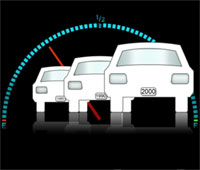The case of the missing gas mileage
By Peter Dizikes, MIT News Office | 06 Jan 2012
Contrary to common perception, the major automakers have produced large increases in fuel efficiency through better technology in recent decades. There's just one catch: All those advances have barely increased the mileage per gallon that autos actually achieve on the road.
 Sound perplexing? This situation is the result of a trend newly quantified by MIT economist Christopher Knittel: Because automobiles are bigger and more powerful than they were three decades ago, major innovations in fuel efficiency have only produced minor gains in gas mileage.
Sound perplexing? This situation is the result of a trend newly quantified by MIT economist Christopher Knittel: Because automobiles are bigger and more powerful than they were three decades ago, major innovations in fuel efficiency have only produced minor gains in gas mileage.
Specifically, between 1980 and 2006, the average gas mileage of vehicles sold in the United States increased by slightly more than 15 percent - a relatively modest improvement. But during that time, Knittel has found, the average curb weight of those vehicles increased 26 percent, while their horsepower rose 107 percent. All factors being equal, fuel economy actually increased by 60 percent between 1980 and 2006, as Knittel shows in a new research paper, ''Automobiles on Steroids,'' just published in the American Economic Review .
Thus if Americans today were driving cars of the same size and power that were typical in 1980, the country's fleet of autos would have jumped from an average of about 23 miles per gallon (mpg) to roughly 37 mpg, well above the current average of around 27 mpg. Instead, Knittel says, ''Most of that technological progress has gone into [compensating for] weight and horsepower.''
And considering that the transportation sector produces more than 30 percent of U.S. greenhouse gas emissions, turning that innovation into increased overall mileage would produce notable environmental benefits. For his part, Knittel thinks it is understandable that consumers would opt for large, powerful vehicles, and that the most logical way to reduce emissions is through an increased gas tax that leads consumers to value fuel efficiency more highly.
''When it comes to climate change, leaving the market alone isn't going to lead to the efficient outcome,'' Knittel says. ''The right starting point is a gas tax.''



















